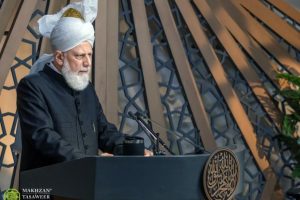After recent events across the world are we now ready to look deeper into the boundaries of segregation?

Western societies promote themselves as bastions for the equality of women and positively contrast themselves with Eastern societies, where women are said to be repressed and denied equal rights. The recent much published scandals around the exploitation of women in Hollywood and Parliament earlier this year suggest otherwise, and has ignited heated debate on the issue of women’s safety in society. How can women avoid unwanted attention and yet freely interact with men on an equal footing?
The hashtag ‘me too’ started by Alyssa Milano drew personal stories from women in all industries across the world. Millions of them used Twitter, Facebook and Instagram to disclose the harassment and abuse they have faced in their own lives. Reports of the abuse of women are not limited to one country or even continent, but come from across the world.
The anti-Islam writer Peter Hitchens jumped into the debate. He argued that society has lost its rules and regulations that ‘were part of an elaborate code of courtship and respect which was learned by example in the married family, and has now completely vanished.’ He asked ‘In our post-marriage free-for-all, why should we expect either sex to be restrained?…It was that old code which allowed us, unlike the Islamic world, to permit the happy mixing of men and women without black shrouds, veils and “no-touching” rules so strict that they even rule out a male-female handshake.’1

Mihai Surdu | Shutterstock
Hitchens makes a valid point. Marriage was designed as an institution to safeguard family and society. The rights of married couples have been enshrined in law, although that is increasingly under attack with couples choosing to cohabit instead. Now, with the introduction of gay marriage in many countries, the boundaries are becoming ever more blurred. But does Hitchens really believe that women were not subject to abuse even under ‘the old code’? Why then are we seeing a rise in cases of the reporting of historic sexual abuse not only by celebrities and those in positions of political power?
Mayim Bialik, a US actress, made some interesting observations for which she was lambasted in the media. Commenting on her experiences as a child actor in Hollywood she says, ‘I still make choices every day as a 41-year-old actress that I think of as self-protecting and wise. I have decided that my sexual self is best reserved for private situations with those I am most intimate with. I dress modestly. I don’t act flirtatiously with men as a policy. In a perfect world, women should be free to act however they want. But our world isn’t perfect. Nothing – absolutely nothing – excuses men for assaulting or abusing women. But we can’t be naïve about the culture we live in.’2
Hitchens is right that ‘dreadful, often tragic things that happen when men and women abandon the old rules of fidelity and constancy, and wrongly imagine that total freedom leads to total happiness.’ However, as Bialik points out, we do not live in a perfect world. We have a responsibility for looking after ourselves – and that responsibility applies to men and women equally.

3D_creation | Shutterstock
As a society, we need to ask ourselves how we intend to safeguard the rights of women to lead normal lives and move freely in society and the rights of men to be able to do likewise without fear of censure or complaint. No woman or man should ever be subject to abuse of any form. Men and women therefore need to respect each other and themselves. But how do we do this without clear boundaries around what is acceptable and unacceptable social conduct?
The issue of safeguarding women is not limited to clandestine affairs. Women face daily provocation from men. Studies suggest that 32% of women say they have been verbally harassed on London’s transport network, with 19% being the victims of direct physical abuse, according to a joint poll between Thompson Reuters and YouGov.3 In France more than 220,000 women were sexually harassed on public transport between 2014 to 2015,which the national crime statistics agency described as a ‘conservative estimate’.4
Cities have tried to tackle these problems in various ways. Women-only train carriages have been introduced in Rio de Janeiro, Moscow, Cairo and Japan. Italy has just established a women-only beach. In the USA, The Hamilton Crowne Plaza is one of a small, but growing, number of hotels offering floors dedicated to female travellers. The 2017 New Year’s eve festivities in the German city of Berlin included women-only safety zones following concerns about sexual assaults after dozens of women were sexually assaulted and robbed at Cologne’s New Year’s Eve celebrations two years ago.

PatWallace05 | Shutterstock
It would seem then that for women to feel respected and safe requires more than just the physical separation of men from women. It requires a model of morality which clarifies the boundaries of acceptable behaviour for both men and women.
So has Islam got anything better to offer? Firstly, let us be clear. True Islamic segregation is not the cultural practice of shrouding women and girls from head to toe, making it difficult for them to even see as they walk. It is not preventing women from seeking education and employment in case they must mix with men. It is not the prevention of women from running their own affairs.
The concept of Islamic segregation is based on a model of chastity incumbent on both men and women, that guides both to maintain boundaries of modesty and respect between one another. In some instances, these are physical boundaries, e.g. separate prayer areas, or meeting spaces. In all cases it is about the maintenance of modesty and decency in interactions between men and women.
Writing in The Philosophy of the Teachings of Islam, The Promised Messiahas reminds us that moral qualities are needed to rid ourselves of evil. Ihsan, or chastity, then is the active avoidance of situations that may lead to immorality – which is a responsibility for both men and women.5 In this verse of the Holy Qur’an, men are directed not to look at women so openly as to be sexually excited by them. This includes safeguarding their senses so that they are not tempted by women. Women in turn are instructed likewise and to dress in a manner that offers them further protection – to wear a head covering and clothes that do not draw attention to their form.

Myvisuals | Shutterstock
The Holy Qur’an also instructs ‘Approach not adultery’. So here too is an instruction that one must also actively avoid situations that might lead to this road. So, men and women who are unrelated to each other are cautioned not to allow themselves to be in situations that could allow either party to be subject to allegations of inappropriate conduct at a later juncture.
The Promised Messiahas further writes:
The Book of God does not aim at keeping women in seclusion like prisoners. This is the concept of those who are not acquainted with the correct pattern of Islamic ways. The purpose of these regulations is to restrain men and women from letting their eyes to rove freely and from displaying their good looks and beauties, for therein lies the good of men and women.6
As the Promised Messiahas explains, these measures are not about limiting the movement of women in society – Muslim women work in many spheres of life – but it is about putting in place boundaries and safeguards that protect both sexes from allegations which can and do destroy reputations. These boundaries are not just physical but also spiritual – and to win the pleasure of Allah, Muslim men and women ensure that they not trespass the limits of acceptable social interaction. This way both genders are freed up to lead normal lives without fear of being put in physical danger and without fear of being accused of unacceptable conduct.
In a crude swipe at Islam, Hitchens also ironically raises the need for such safeguards:
Wise men at Westminster will in future go about with chaperones, record and film all conversations with the opposite sex, require women to sign consent forms before meeting them, and certificates of good conduct afterwards. Nothing else will keep them safe from claims that they momentarily applied ‘a fleeting hand’ to someone’s knee.
Or there is always the other solution, the niqab, the burka and the segregation of the sexes.
Hitchens might be surprised to learn that the true Islamic model of morality does operate in the Ahmadiyya Muslim Community:
Segregation is grossly misunderstood when it is conceived as an imposition of restriction on female members of the Muslim society from fully participating in all spheres of human activities. This is not true. The Islamic concept of segregation is only to be understood in the context of measures to protect the sanctity of female chastity and the honour of women in society so that the dangers of violating these objectives are minimised. Free mixing of both sexes and clandestine affairs between men and women are strongly discouraged.7
Ahmadi Muslim women dressed in burqas, hijabs, and niqabs work both alongside men and apart from men, successfully running hospitals and schools, and organising events throughout the year, from international gatherings to book fairs and local events. The scale of these operations can be vast. The UK Annual Convention of the Community in 2017 attracted over thirty-five thousand people. Men and women jointly planned, hosted and ran the segregated event. At the renowned Tahir Heart Institute in Rabwah, Pakistan, female doctors and nurses attended to patients while wearing hijabs or niqabs. Humanity First, a charity run by the Ahmadiyya Muslim Community, regularly has Ahmadi women serving in capacities as diverse as fundraising, providing medical help, and painting classrooms. All of this happens and yet there are no reported cases of harassment to women.
Hazrat Mirza Masroor Ahmadaba, the fifth successor to the Promised Messiahas, has on numerous occasions eloquently elucidated the teachings of morality and the teachings of Islam regarding segregation:
Those who level objections against Islam are accepting the fact that in some situations separation of gender is wise. In some places the option of making separate organisations for men and women has been discussed. This worldly society is also sensing the need of separating men and women. Those who level allegations against us regarding the segregation of genders are now accepting the fact that in some situations separation is a must.8
Perhaps it is now high time to examine, rather than mock, Islam’s solution for peace in society.
…………………………………………………………
About the Author: Dr Sarah Waseem is a Consultant Clinical Psychologist working in the UK’s National Health Service. She serves as an editorial board member for the The Review of Religions and also in the Production Department of Muslim Television Ahmadiyya International.
…………………………………………………………
Endnotes
1. Peter Hitchens, “What Will Women Gain From All This Squawking About Sex Pests? A Niqab,” Daily Mail, accessed November 4, 2017, www.dailymail.co.uk/debate/article-5050887/What-women-gain-squawking-sex-pests-Niqab.html.
2. Mayim Bialik, “Being A Feminist In Harvey Weinstein’s World ,” The New York Times, October 13, 2017, https://www.nytimes.com/2017/10/13/opinion/mayim-bialik-feminist-harvey-weinstein.html
3. Monique Villa, “Sexual harassment on public transport is a problem we must solve”, The Independent, October 29, 2014, https://www.independent.co.uk/voices/comment/sexual-harassment-on-public-transport-is-a-problem-we-must-solve-9826153.html.
4. Reuters, December, 2012.
5. The Holy Qur’an, 24:31-32.
6. Hazrat Mirza Ghulam Ahmadas, Philosophy of the Teachings of Islam, (1905).
7. Hazrat Mirza Tahir Ahmadrh, Islam’s Response to Contemporary Issues, 92.
8. Hazrat Mirza Masroor Ahmadaba, ‘Preparing for Tomorrow – Raising Pious Children’, The Review of Religions, October 2017, https://test-review-of-religions.pantheonsite.io/13395.




Add Comment